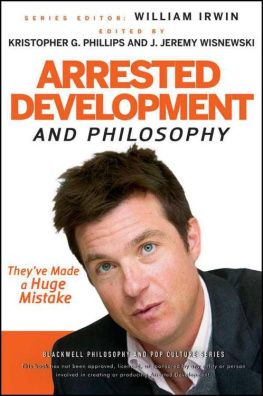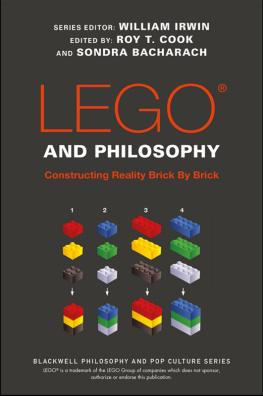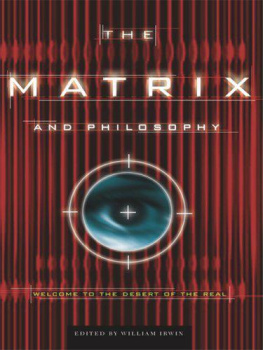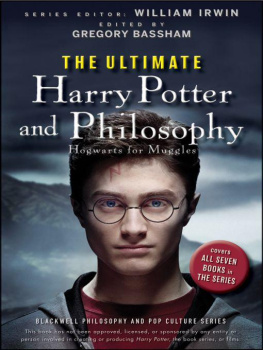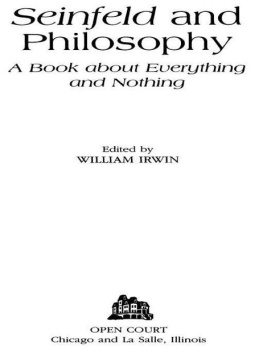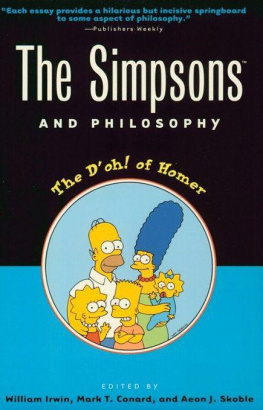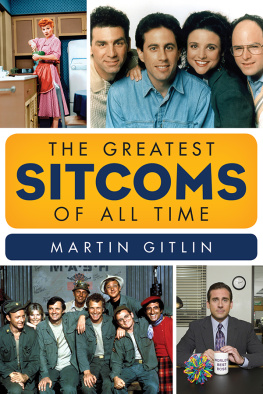CONTENTS
The Blackwell Philosophy and Pop Culture Series
Series Editor: William Irwin
South Park and Philosophy
Edited by Robert Arp
Metallica and Philosophy
Edited by William Irwin
Family Guy and Philosophy
Edited by J. Jeremy Wisnewski
The Daily Show and Philosophy
Edited by Jason Holt
Lost and Philosophy
Edited by Sharon Kaye
24 and Philosophy
Edited by Jennifer Hart Weed, Richard Davis, and Ronald Weed
Battlestar Galactica and Philosophy
Edited by Jason T. Eberl
The Office and Philosophy
Edited by J. Jeremy Wisnewski
Batman and Philosophy
Edited by Mark D. White and Robert Arp
House and Philosophy
Edited by Henry Jacoby
Watchmen and Philosophy
Edited by Mark D. White
X-Men and Philosophy
Edited by Rebecca Housel and J. Jeremy Wisnewski
Terminator and Philosophy
Edited by Richard Brown and Kevin Decker
Heroes and Philosophy
Edited by David Kyle Johnson
Twilight and Philosophy
Edited by Rebecca Housel and J. Jeremy Wisnewski
Final Fantasy and Philosophy
Edited by Jason P. Blahuta and Michel S. Beaulieu
Alice in Wonderland and Philosophy
Edited by Richard Brian Davis
Iron Man and Philosophy
Edited by Mark D. White
True Blood and Philosophy
Edited by George Dunn and Rebecca Housel
Mad Men and Philosophy
Edited by James South and Rod Carveth
30 Rock and Philosophy
Edited by J. Jeremy Wisnewski
The Ultimate Harry Potter and Philosophy
Edited by Gregory Bassham
The Ultimate Lost and Philosophy
Edited by Sharon Kaye
Green Lantern and Philosophy
Edited by Jane Dryden and Mark D. White
The Girl with the Dragon Tattoo and Philosophy
Edited by Eric Bronson
Arrested Development and Philosophy
Edited by Kristopher Phillips and J. Jeremy Wisnewski

Copyright 2012 by John Wiley and Sons. All rights reserved
Published by John Wiley & Sons, Inc., Hoboken, New Jersey
Published simultaneously in Canada
No part of this publication may be reproduced, stored in a retrieval system, or transmitted in any form or by any means, electronic, mechanical, photocopying, recording, scanning, or otherwise, except as permitted under Section 107 or 108 of the 1976 United States Copyright Act, without either the prior written permission of the Publisher, or authorization through payment of the appropriate per-copy fee to the Copyright Clearance Center, 222 Rosewood Drive, Danvers, MA 01923, (978) 750-8400, fax (978) 646-8600, or on the web at www.copyright.com . Requests to the Publisher for permission should be addressed to the Permissions Department, John Wiley & Sons, Inc., 111 River Street, Hoboken, NJ 07030, (201) 748-6011, fax (201) 748-6008, or online at http://www.wiley.com/go/permissions .
Limit of Liability/Disclaimer of Warranty: While the publisher and the author have used their best efforts in preparing this book, they make no representations or warranties with respect to the accuracy or completeness of the contents of this book and specifically disclaim any implied warranties of merchantability or fitness for a particular purpose. No warranty may be created or extended by sales representatives or written sales materials. The advice and strategies contained herein may not be suitable for your situation. You should consult with a professional where appropriate. Neither the publisher nor the author shall be liable for any loss of profit or any other commercial damages, including but not limited to special, incidental, consequential, or other damages.
For general information about our other products and services, please contact our Customer Care Department within the United States at (800) 762-2974, outside the United States at (317) 572-3993 or fax (317) 572-4002.
Wiley also publishes its books in a variety of electronic formats and by print-on-demand. Some content that appears in standard print versions of this book may not be available in other formats. For more information about Wiley products, visit us at www.wiley.com .
ISBN 978-0-470-57559-8 (paper); ISBN 978-1-118-14609-5 (ebk); ISBN 978-1-118-14626-2 (ebk); ISBN 978-1-118-14627-9 (ebk)
ACKNOWLEDGMENTS
And Now a Few Words from the New CEOs of the Bluth Company
Three years ago we set out to keep this family together... and it looks as if... (pardon us if we get a bit choked up here) it looks as if weve succeeded in that goal. Okay, maybe were not really the CEOs of any company, and we certainly didnt succeed in keeping the Bluths on television, let alone together, but we do have some people to thank for making this book happen.
We really lucked out a number of times and would like to extend serious thanks to our Banana Stand staff both for moving the Bluth Company down one floor to save on costs and ultimately saving the company, and for contributing wonderful works to our book without having made too many huge mistakes. Were also endlessly grateful to Connie Santistiban for making this work sparkle, and Bill Irwin for his Michael-esque patience in working with Kriss (very) Buster-esque pestering (panic attacks and all) about the viability of the project.
Kris would like to thank Shawn Akbar and Amber Griffioen for their help and encouragement; you guys are the Gob and Lindsay to his Buster. He would also like to thank various co-graduate students at the U of I for reading papers and giving him invaluable feedback, in particular Seth Jones, Sam Taylor, and Matt Drabek. Kris would also like to extend thanks to his parents Jeff and Joyce Phillips, mostly for being nothing like George Sr. and Lucille, and by that he means, for encouraging him every step of the way. Most importantly, he would like to thank his wife Nateasa McGuire for reading, re-reading, and listening to him read the papers in this book, for giving him ideas much better than those that he came up with himself, and for all of your support.
Jeremy would like to thank Jackie Seamon for reading through the book, hunting out mistakes, and then yelling about them. He would also like to thank all of those friends who listened to him recite scenes from episodes of Arrested Development, patiently smiling, and indulging him despite the oodles of other things they had to do. You know who you are. Finally, Jeremy would like to thank his wife, Dorothy, for her continuous support. He wouldnt make it without her. The children also deserve a thank you. It aint easy being a philosophers kidso thanks are due to Audrey and Lucian.
Of course, frozen bananas dipped in chocolate deserve the most thanks of all. When things get rough, after all, theres always money in the Banana Stand.
INTRODUCTION
Kristopher Phillips
This is the story of a wealthy family who lost everything (including their show) and the group of philosophers who had no choice but to write a book about it.
Well, its a matter of philosophical debate whether or not we really had a choice in the matter (or ever), but one thing is for surewe really wanted to.
The reasons for wanting to write on the philosophical underpinnings in Arrested Development are probably as diverse as the characters in the showI, for one, had many different reasons, including (and certainly not limited to) an intense desire to watch and rewatch the entire series with friends and professors. As I watched, and rewatched, I found myself wondering whether the Bluths really are as unrelatable as they think they are (at least in the third season).
As I watched Buster, the youngest of the Bluth boys and the self-proclaimed scholar of the family, it occurred to me that perhaps the show ended prematurely not because the family is weird and difficult to relate to, but rather because each character might be seen to exhibit the traits that we are afraid (fear turns to anger... so frightened inmate number 2 isnt frightened at all, hes a crabby old coot!) that we exhibit in the various roles we fill. For example, I often fear that Buster represents academics in general (or at least perpetual graduate students), especially those of us that tend to study the more esotericheadytopics. Buster is someone who is moderately intelligent and uses his familys considerable assets to pursue academic avenues thatwell, lets face itreally dont offer much by way of preparation for the real world; didnt everything get mapped out by Magellan, or NASA? Busters life embodies the spirit of the question most often asked to students of philosophy: What are you going to do with that?
Next page
